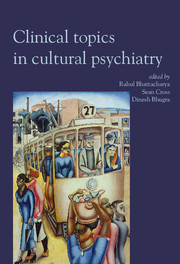Book contents
- Frontmatter
- Dedication
- Contents
- List of tables
- List of boxes
- List of figures
- List of contributors
- Preface
- Part 1 Theoretical and general issues
- Part 2 Specific mental health conditions across cultures
- 8 Schizophrenia in African–Caribbeans: contributing factors
- 9 Depression in immigrants and ethnic minorities
- 10 Attempted suicide among South Asian women
- 11 Mental health of the ageing immigrant population
- 12 Intellectual disability and ethnicity: achieving cultural competence
- 13 Culture and liaison psychiatry
- 14 Addiction in ethnic minorities
- 15 Sex and culture
- 16 Culture in child and adolescent psychiatry
- 17 Black and minority ethnic issues in forensic psychiatry
- 18 Cultural perspectives on eating disorders
- Part 3 Management issues in the cultural context
- Index
13 - Culture and liaison psychiatry
from Part 2 - Specific mental health conditions across cultures
Published online by Cambridge University Press: 02 January 2018
- Frontmatter
- Dedication
- Contents
- List of tables
- List of boxes
- List of figures
- List of contributors
- Preface
- Part 1 Theoretical and general issues
- Part 2 Specific mental health conditions across cultures
- 8 Schizophrenia in African–Caribbeans: contributing factors
- 9 Depression in immigrants and ethnic minorities
- 10 Attempted suicide among South Asian women
- 11 Mental health of the ageing immigrant population
- 12 Intellectual disability and ethnicity: achieving cultural competence
- 13 Culture and liaison psychiatry
- 14 Addiction in ethnic minorities
- 15 Sex and culture
- 16 Culture in child and adolescent psychiatry
- 17 Black and minority ethnic issues in forensic psychiatry
- 18 Cultural perspectives on eating disorders
- Part 3 Management issues in the cultural context
- Index
Summary
Summary Liaison psychiatry, the branch of psychiatry that operates at the interface of general medicine and psychiatry, faces challenges related both to the different cultures of the two disciplines and to the care of patients who belong to minority cultural backgrounds. In this chapter, cultural issues that are likely to come up in encounters between liaison psychiatrists trained in the West and patients from non-Western cultures are explored. Emotional disorders in the medically ill, medically unexplained symptoms and self-harm are used to illustrate these. Other topics discussed include cultural aspects of ethical problems in the general hospital and cultural sensitivity in psychiatric assessments and treatment. The chapter ends with a model of a culturally capable liaison service.
Liaison psychiatry, also known as consultation-liaison psychiatry, is the subspecialty of psychiatry that provides psychiatric care to patients presenting in medical settings. Services have traditionally been based in general hospitals, where they provide psychiatric consultations on medical and surgical wards, in emergency departments and in out-patient clinics. In spite of recognition as a subspecialty with the achievement of faculty status within the Royal College of Psychiatrists, liaison services remain patchy. Thus, in the UK it is still a growing specialty.
Cultural challenges in liaison psychiatry
In these globalised times hospitals in Western countries, particularly in large cities, see patients from all over the world. The term ‘hyperdiversity’ has been used to refer to the mix of ethnicities, cultures and identities seen in conurbations (Kirmayer, 2007). Many of them include refugees or asylum seekers with traumatic histories and poor skills in communicating in the dominant language. These patients often do not do well in general hospitals as they are unable to express themselves. It is known that patients with mental illnesses in general hospitals experience stigmatising attitudes (Liggins & Hatcher, 2005) and experience more adverse events during their hospital stay (Daumit et al, 2006). The culturally different patient with a mental illness may thus be the victim of double jeopardy. The liaison psychiatrist, whose role goes beyond psychiatry to psychosocial advocacy (Smith, 1998), needs to have advanced skills in assessing and treating a patient from a different culture.
- Type
- Chapter
- Information
- Clinical Topics in Cultural Psychiatry , pp. 171 - 181Publisher: Royal College of PsychiatristsPrint publication year: 2010



